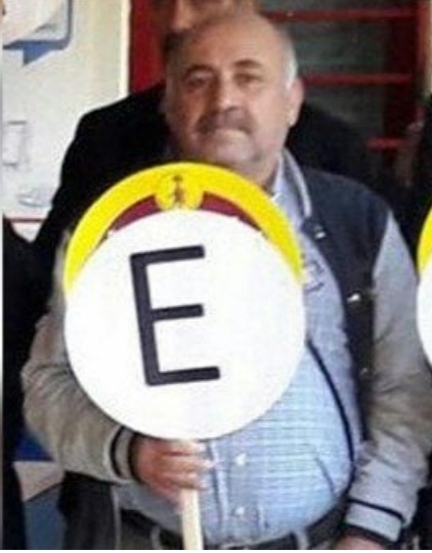This site is a database study that set out to be the memory of deaths in custody, detainee, sick and exile, deaths and abductions in Aegean and Maritza as victims of Tenkil.

- Death Date 22/04/2019
- Place of Death Diyarbakir
- Cause of Death Cancer
- Date of Burial , Diyarbakir
Biography
Ahmet Coban was the former Diyarbakir Branch Chairman of the Finance Workers and Office Workers’ Union (BES). He was purged from his job with Decree-Law No: 677 and passed away in Diyarbakir due to cancer after his dismissal. Struggling over the years in the Trade Union arena, Ahmet Coban suffered from the State of Emergencies twice in his life: First of all, he spent his years in exile from 1999 to 2002 due to the State of Emergency and secondly, he was purged in 2016 with a Decree-Law under State of Emergency order.
Coban was diagnosed with cancer and sadly passed away on April 22, 2019, but he was reinstated ten months later, after his death, to his job. Ahmet Coban, who started working at Diyarbakir Revenue Office in the 1990s, fought for years in the Union of Finance Officers (Maliye-Sen), a member of Confederation of Public Employees’ Unions (KESK). Due to his vitality and activeness in the union, Coban was exiled to Nevsehir city in 1999 by the Regional Governor during the then State of Emergency.
Forced to work in exile for three years, Coban and his family were exposed to mobbing in their apartment and workplace. However, Coban returned to Diyarbakir in 2003 when he was successful against the exile decision at the Administrative Court. Continuing his exertion in the union, Coban took on many duties, including the Branch Chairman of the Bureau Workers’ Union (BES), formerly known as Maliye-Sen.
DIAGNOSED WITH CANCER AND ISOLATED HIMSELF
Mr Coban was exiled during the long years of the State of Emergency in the 1990s and expelled 13 years later with the Decree-Law (KHK) enacted on November 22, 2016, within the scope of the State of Emergency declared after 15th July. Mr Coban, who rechallenged a painful period due to the Decree-Law, was diagnosed with blood pressure, diabetes and lung cancer. He had treatment for his illness; however, he preferred not to go outside due to the social pressure and became more introverted during his vanishing days. Mr Coban died after succumbing to a relentless disease in April 2019; however, he was reinstated to his job by the State of Emergency Procedures Investigation Commission 10 months after his death. Mr Coban passed away, but he was remembered as the concrete story of the unlawful created by the OHAL decrees.
Getting her words stuck in her throat, Coban’s wife, Kiymet Coban, could not get over the shock she experienced and spoke to the Mesopotamia New Agency. Coban, who talked about her husband’s exile to Nevsehir in 1999 and the difficulties they encountered, described her experiences as follows: “My husband stayed in Nevsehir alone for three years. When the schools were closed, I went to him with the children, but when we went to Nevsehir, we encountered the reaction of “terrorists arrived”. We were disconsolate. After plying between Diyarbakir and Nevsehir for two years (8.5 hours of journey, 650 km), we settled in Nevsehir for a year. After that, we were dragged from our birthplace unjustly and unlawfully. I will never forget that I knocked on one of my neighbour’s door one day in the building to give her homemade food. However, she was afraid to open the door because they all regarded us as ‘terrorists’. Fortunately, we won the case in the court and our life in exile ended in 2003; thus, we returned to our homeland.”
Mr Coban’s wife, Kiymet Coban, could not get over the shock she experienced and spoke to the Mesopotamia New Agency with lumps in her throat. Mrs Coban, who talked about her husband’s exile to Nevsehir in 1999 and the difficulties they encountered, described her experiences as follows: “My husband stayed in Nevsehir alone for three years. When the schools closed for the summer holidays, I went next to him with our children. We encountered the reaction of “terrorists arrived” when we arrived at Nevsehir by the locals. We were disconsolate. After plying between Diyarbakir and Nevsehir for two years (8.5 hours of journey, 650 km), we settled in Nevsehir for a year. After that, we were dragged from our birthplace unjustly and unlawfully. I will never forget that I knocked on one of my neighbour’s door one day in the building to give her homemade food. However, she was afraid to open the door because they all regarded us as ‘terrorists’. Fortunately, we won the case in the court and our life in exile ended in 2003; thus, we returned to our homeland.”
Mrs Coban stated that her husband had no underlying health conditions prior to being expelled. Furthermore, her husband faced severe depression and was wholly confined to the house for a year. Mrs Coban also elaborated that her husband did not talk to them during this period when he was at home only. They first took him to the hospital with blood pressure and diabetes complaints, and then he was diagnosed with lung cancer. Mrs Coban mentioned that they borrowed money from the pharmacy because they could not afford the needles to be used in the treatment process, and they still haven’t been able to pay it back.
Photos


Copyright © 2021 Tenkil Museum
